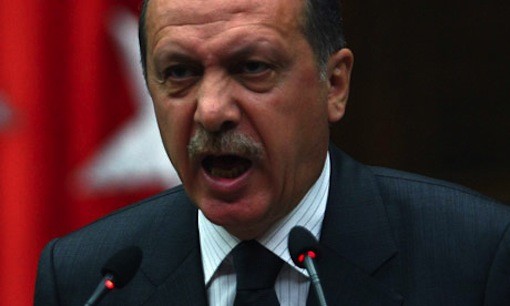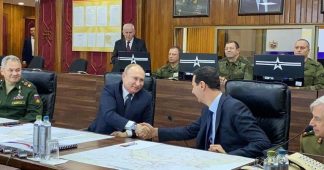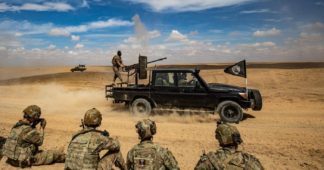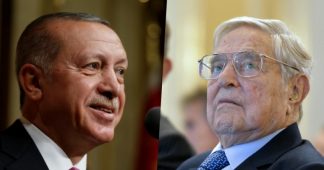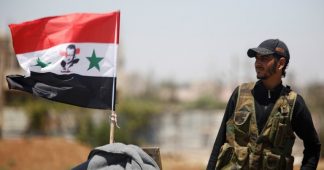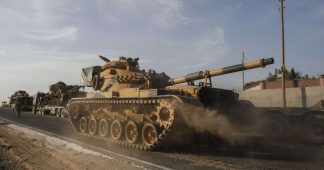9 June، 2022
Damascus, SANA- President Bashar al-Assad said that Russia is facing a war that cannot be linked to the issue of NATO expansion, but rather it is an ongoing war that did not stop even before communism or before World War I, affirming that Russia’s power today constitutes a restoration of an international equilibrium.
“So, we can view Russia from two perspectives. The first is that of an ally; if our ally triumphs in the battle, or if their political position is strengthened on the international arena, then this is a win for us as well. From a second perspective, Russia’s power today constitutes a restoration – albeit partial, of an international equilibrium. This rebalance that we are seeking, will impact smaller countries, including Syria. This is my strategic view – the bottom line, without going into other legal aspects,” President al-Assad added in an interview given to RT Channel.
President al-Assad affirmed that Syria would resist any Turkish invasion of its lands, saying, “If there is an invasion, there will be popular resistance in the first stage…. Of course, in the places where the Syrian army is positioned, and it is not deployed to all regions in Syria, and when military conditions allow for direct confrontation, we will do this thing.”
“Two and a half years ago, a confrontation occurred between the Syrian and Turkish army, and the Syrian army was able to destroy some Turkish targets that entered Syrian territory…The situation will be the same according to what the military capabilities allow… In addition, there will be popular resistance,” the President added.
Following is the full text of the interview:
Introduction: To our viewers, welcome to a new edition of “News Maker,” coming to you from the Syrian capital Damascus, with an interview with Syrian President Bashar Al-Assad.
Mr. President, welcome to RT, and thank you for receiving us.
President Assad: You are welcome in Damascus, Syria.
Journalist: Thank you very much.
Question 1: Let us start Mr. President with the most prominent issue on the international arena and pose a question from our viewers on Arabic.RT.com: why has Damascus supported the Russian Special Military Operation in Ukraine?
President Assad: There are several reasons. First, Russia is Syria’s ally, and Russia is facing a war which in my view is not linked to the expansion of NATO, as some people may think. This animosity has existed even before communism and the First World War, it is an ongoing war, and Russia plays an important role to ensure an international equilibrium exists.
So, we can view Russia from two perspectives. The first is that of an ally: if our ally triumphs in the battle, or if their political position is strengthened on the international arena, then this is a win for us as well. From a second perspective, Russia’s power today constitutes a restoration – albeit partial, of an international equilibrium. This rebalance that we are seeking , will impact smaller countries, including Syria. This is my strategic view – the bottom line, without going into other legal aspects.
Question 2: Russian officials say that it is the battle for a new world order. Mr. President, do you see this as the final throes of American hegemony, or are we still far away from a multipolar world?
President Assad: There are those, who refer to this war as the end of the unipolar system that was created as a result of the collapse of the Soviet Union; this is inaccurate. It is partially correct if we are referring to NATO after the disappearance of the Warsaw Pact, or if we view it from a political perspective and the dominance of Western powers, under the leadership of the United States, of the UN Security Council. However, in reality, the unipolar system was created after the Second World War, when the Bretton Woods Conference established a new monetary order that made the US dollar the world reserve currency.
Today, what is more important than the military outcomes, or at least what is equally important so as not to exaggerate, are the economic outcomes of this war, particularly the status of the dollar. If the dollar continues to govern the world economy, nothing will change, regardless of the results of the war.
Question 3: Staying with the dollar, many people say that the United States is using the dollar to blackmail the world and those who opposed it. How do you view this Western economic war against Moscow and can it be compared with the economic sanctions against Syria?
President Assad: First, using the dollar is not blackmail, it is robbery, because after the Second World War, the Americans pledged that the dollar would reflect the gold reserve (they pegged the dollar to gold). At the beginning of 1970s during the Nixon administration, the United States decided to abandon the Gold Standard, separating the dollar from gold, and consequently it became a worthless piece of paper. But in fact the United States still continues to trade around the world using this worthless piece of paper. This is robbery, and it applies to the whole world. Recently, the US raised interest rates, and as a consequence the value of all other currencies dropped, affecting the economically weaker countries.
Yes, it is a tool for sanctions. As long as the dollar is a global currency and continues to be settled through US banks or what is called the American Federal Reserve, you are under the authority, of this dollar; and therefore, your future as a state, a country or society, as an economy is under the mercy of the United States. It is a central part of the sanctions, and without it (the dollar) America would not be a super power at all.
Question 4: Mr. President, I also asked about the comparison between the sanctions against Moscow and the experience of Damascus in this regard. To what extent is the comparison valid?
President Assad: You mean the sanctions, regardless of the dollar? Of course, it is the same mentality: a mentality of hegemony, colonialism and arrogance. They still believe that the situation is as it was several decades ago, and that the West controls everything the world needs.
Today, the world has changed; there is Russia, China, and many other rising countries. Yes, we are under sanctions, but many of our basic needs are not bought from Western countries, we have severed our relations with them. These countries still have the same mentality and this will lead to the same failure. Every country can now secure its basic livelihood and growth requirements without American permission.
Question 5: This could be a positive message for Russian citizens, but let’s talk also, Mr. President, about the Syrian citizens and all the economic challenges they face. Are the sanctions the only reason for this crisis: the collapse of the Syrian pound, the difficult living conditions and other challenges?
President Assad: No, not at all and I have stated this publicly. Yes, the sanctions are part of the problem, because they raise costs and slow the economic process, but there are other global reasons like Covid-19 for example.
The West is presenting a narrative that the current problems are a result of the Ukraine war and more precisely a result of Russian policy. The reality however, is different. Some of the national challenges are due to internal economic plans and not only external factors. So, it is important to distinguish between challenges arising as a result of sanctions, as a result of government plans or as a result of the overall economic environment, which could be due to policies of companies or habits of citizens. These all impact the economic situation both positively and negatively.
Intervention: Part of it has to do with corruption too?
President Assad: Exactly, the economy is affected by numerous factors, including management as well.
Question 6: Let’s stop a little with your plan for combating corruption?
President Assad: Most countries in a state of war tend to delay or halt many core processes, one of which is fighting corruption. In Syria, our view is different: because of the war, we need more than ever to combat corruption. This is for the simple reason that wars weaken state institutions, and when state institutions are weak, corruption becomes more widespread. This is a common unfortunate consequence of war in any country, and is not unique to Syria. Therefore, during such times you need to increase your efforts at combatting corruption and this is what we are doing. Of course there are obstacles: the war itself is an obstacle, the weakness of state institutions as a result of war is another obstacle, as well as the administrative system that requires a lot of reform and is the most important factor in fighting corruption.
So, we are proceeding with this approach across all sectors: political, economic and administrative, but due to our current circumstances, there is no guarantee that we will be able to achieve our ambitions.
Question 7: This is true, particularly that the Syrian people have renewed their trust in you Mr. President. Your campaign slogan was “Hope in Action,” but in our tour of the country and when talking with Syrians, we felt a sort of frustration because of the difficult conditions they are facing. Here we ask, to what extent can this hope be revived in a Syria that is losing its oil resources because they are under the control of other parties – we will address this shortly, as well as having to deal with other challenges, wheat for example. What do you have available to you Mr. President?
President Assad: First, what you are saying is correct. I suggested ‘hope’ because there is frustration; I recognized this frustration which led me to adopt the slogan. Second, these words are not a slogan, they are the title of a solution.
Hope doesn’t come from sitting around and waiting, it comes from our attempts to be proactive and productive. Do we have the necessary tools to be productive? Yes, of course we do, otherwise the state would not have endured. Medical care in Syria is still free despite the decline of services; education is still free despite the decline in the quality of education as a result of the circumstances; subsidies are still available, despite the decreasing rate of these subsidies. All of these basic services are still available, with no change in our policy. Similarly, are there new facilities and enterprises growing or emerging during this period of war? Of course there are. There are many people who love their country and are ready to take risks and invest in this current climate, which is not best suited for investment.
Question 8: What is required of the Syrian citizens? How can they accommodate meeting their daily needs under deteriorating living conditions for a cause they consider to be patriotic?
President Assad: If we agree that an increase in productivity is the best solution to improve living conditions and services, then we must identify what the obstacles are. The main obstacle is electricity, and as such our focus since 2021 has been to find solutions to the electricity shortage, which is a result of the sanctions. We have been successful and it is safe to say that during 2022 we will witness an improvement in this field, which no doubt will have a positive impact on our production capabilities.
So both the problem and the solution have been clearly identified and we are moving in the right direction, but we should not raise our expectations too high and believe that all our problems will be resolved; not at all. There will be an improvement and it will be gradual, but we must be aware that there are circumstances that are not in our favor. There are attempts to undermine every step we take towards development. We must deal with each problem as it arises and continue to find sustainable solutions; this is all part of the war. And when I say there is hope, it means that we have the tools and the capabilities to face all attempts from external forces to undermine growth in Syria.
Question 9: These attempts also apply to political reforms. Perhaps I am talking here about the constitutional committee. Why is it not making progress in your opinion?
President Assad: No, this is totally different and has nothing to do with the sanctions. If we are referring to the Constitutional Committee, then the requirement is to arrive at a constitution. A constitution that expresses the desires, the values, the aspirations, and the culture of the Syrian people; one that is a middle ground between all the different segments and currents that exist in our society. If this is the result we aspire to achieve, then logically we are talking about a dialogue between Syrians, or what we might call a Syrian-Syrian dialogue under the assumption that there are two parties.
With regards to the Constitutional Committee, we are also referring to two parties. The first party was proposed by the Syrian government. Its members are neither diplomats nor government employees, but they do represent the views of the Syrian government.
The second party is appointed by Turkey. So the logical question is how is it possible to have a Syrian-Syrian dialogue when one party is Syrian and the other party is Turkish? This is the problem. That is why we are not achieving anything, because quite simply, the first party expresses the aspirations of the Syrian people, while the other party expresses the aspirations of the Turkish government.
Question 10: Nevertheless, Mr. President, let’s talk about what the other party is saying. There are those who say that the Syrian government is concerned that the constitutional committee will produce something that interferes with the authorities of the president. What do you say?
President Assad: This is not an issue. The Syrian Constitution does not express the views of the president, or the government or the ruling party; it expresses the unanimous views of the Syrian people. So, anything agreed by the Syrians is correct, and any state that is created in any form should be in alignment with the new constitution; this is final.
There cannot be stability with a constitution that is at odds with the wishes of the people. That is why whatever outcome is reached by the Constitutional Committee now or later, or under any other circumstances, must be put to a popular referendum; it will not be passed by the government. This is definitive. It should reflect the people and their wishes, and hence the people either approve or reject the constitution.
Question 11: To build consensus among Syrians might be the objective of the general amnesty issued (Decree No. 7) which opened the door for the return of Syrian refugees to Syria and other reformist decisions. Nevertheless, there is criticism to the effect that all those who opposed and oppose President Bashar al-Assad being in power will be treated as traitors of the homeland.
President Assad: No, there are laws in Syria. We do not have what is commonly referred to as “political prisoners;” this term does not exist. There are national givens and we have to be careful to not confuse political freedom with transgressing against national givens. Someone might say why don’t we give up our occupied territories to Israel. This is punishable by law, it is a national issue not a political one.
The same principle applies to other things like opposing the president. There are many Syrians in Syria who do not agree with me on many policies. Opposition to a person or a government is one thing, but transgressing against national givens is another. Those who oppose can do so, there is no problem and this does not affect me personally.
Intervention: Does this also apply to the Kurdish forces?
President Assad: The Kurdish issue is different. If we look at it from a national perspective, the Kurds constitute an ethnicity that has existed in Syria throughout history; the majority of them are patriotic. However, there are some who are not, just as there are also some Arabs, non-Arabs who are also not patriotic and who act as agents for others, especially Americans. The issue has nothing to do with the president or with political opposition, the issue here is the unity of the Syrian homeland.
The notion of multiple ethnicities taking the form of cantons or federations is the beginning of division, whereas the Syrian diversity within a framework of national unity is enriching, and we view this positively. Ethnic, religious and sectarian diversity enriches Syrian society, not the other way. However, when it is presented in the wrong framework it becomes a curse and this is something we do not allow.
Intervention: The door is open for dialogue with everyone, with the exception of those who you have described as agents, particularly of the United States.
President Assad: Sometimes we have to engage even with agents.
Question 12: Nevertheless, I would like to focus on the Kurdish forces in particular those that control the oil wells with American support. What are your views on this, and what cards does Damascus have in order to restore its assets and territories?
President Assad: The problem with any occupation of a country, or any invasion, is not the invasion itself, regardless of how big the army is; the problem lies with the agents who support the invader. This is the issue and it exists in Syria. There are forces acting under the authority of the Americans and on their behalf, against the unity of Syrian society.
The normal reaction, which is what we are starting to see in those areas – the eastern area, is popular resistance since the vast majority of the population do not accept these deviations and refuse to deal with the occupier and this treason. This has started a conflict between these forces and the local population.
As long as there are people who act as agents, the occupier will remain strong. So first, these agents should be purged. They should be weakened, and then the occupier will automatically leave because popular resistance will increase against them. The solution then in facing any invasion, particularly when you do not have the necessary military capabilities, is popular resistance.
Question 13: We are not talking here only about the American challenge, for you also have Turkey which no longer hides its ambition to create what is describes as a safe zone inside Syrian territories. What are your plans to prevent that?
President Assad: It is within the same framework. If there is an invasion, there will be popular resistance in the first instance. Of course, the Syrian army is not deployed in all the Syrian territory, but in the areas where it is deployed, and when conditions allow for direct military confrontation, we will not hesitate. This was the case two and a half years ago when there was a clash between the Syrian and Turkish armies, and the Syrian army destroyed some Turkish targets that had moved into Syrian territories. The same will happen again in as much as the military capabilities will allow.
Question 14: What about Idlib, what is your vision for the situation there?
President Assad: Like any occupied territory, it is subject to the Syrian military and political plans for liberation. There is no doubt about this; any land occupied by the Turks or by the terrorists will be liberated in time.
Question 15: Despite this and with the existence of all these problematic files, there are those who are talking about reconstruction. Are there any urgent plans in that regard? Are there states which have expressed a willingness to take part? There are also those, Mr. President, who have made the link between this file and your visit to UAE capital, Abu Dhabi.
President Assad: There are companies from various Arab states and not the states themselves – which have expressed a desire to take part. If we take into account the extreme pressure applied by the West through sanctions on any company that might invest in Syria, we recognize that the process will be slow and risky for many of them. Nevertheless, there are those that are preparing to invest in Syria in ways which circumvent the sanctions.
If we want to talk about reconstruction in its broad sense, I cannot say that the current political, economic or security situation allows for large scale reconstruction. Nevertheless, a process of reconstruction has started albeit a limited one. This is partly through investors, companies or individuals who are rebuilding their facilities and infrastructure, and partly through the state’s effort in rebuilding the arteries that constitute the core of economic life in some of the big cities.
Question 16: I would like to stop a little with your visit to Abu Dhabi and Syria’s return through this large gate, as it was described. How do you yourself see it?
President Assad: I don’t know how a large gate is defined and what the word return means, because we never left. Syria has remained in its place, with the same positions and the same conditions, dealing with them in its own way and according to its principles and perspectives. However, I would like to say that in their essence, Syrian-Arab relations have not changed much during the war; most Arab states have maintained their relations with us and stood with us.
Intervention: Even those that withdrew their diplomatic missions?
President Assad: Yes, even those that withdrew their diplomatic missions maintained the relationship and kept positive feelings towards Syria despite not being able to do anything. Their position is the same, with some formal changes happening to this relationship as a result of the change in circumstances whether regional, global or any other, but I cannot speak on their behalf. However, I do not believe there is a great change in substance, the big change that is happening is in terms of form.
Question 17: Let’s ask honestly: does Damascus have any grudge against the countries which abandoned her during its crisis?
President Assad: First of all, to grudge is proof of weakness. Secondly, begrudging doesn’t lead anywhere, and does not create any positive results especially in relations with countries. Thirdly, we have to distinguish between policy errors made by states and the people in these states. We seek Arab-Arab relations, which means relations between people; and in this case, there are no grudges. Fourthly, we know that Arab countries have their own circumstances. We are able to say no on many issues, perhaps, many Arab countries are unable to do the same.
This is not a justification but it is fait accompli, and we have to deal with it. Blaming and complaining does not achieve results. That’s why we should look to the future and this is what we say in all of our discussions. We look to the future, what happened in the past is in the past. Blaming does not change anything: the destruction has happened, the losses have been incurred and the blood has been spilled; so let’s talk positively. This is the Syrian approach.
Question 18: In the near future, the Arab summit will be hosted by Algeria. Many people are talking about you attending the summit. Are there any steps in this regard?
President Assad: Perhaps the only weight this summit has is the fact that it is held in Algeria. This is a fact, I am not being diplomatic here. Syria’s relations with Algeria, under all circumstances and since its independence from France in the early 1970s have been consistent. There is something solid between the two peoples, maybe because the history is similar despite the different periods.
But if we address the Arab league, regardless of the Algeria summit, the question is not Syria’s return or non-return – and the word return is wrong because Syria is still in the Arab League. Its membership was suspended, Syria did not leave.
The issue is: what will the Arab League do in the future, regardless of whether Syria is in the league or not. Will it achieve any of the aspirations of the Arab citizens? I do not believe that it has achieved anything throughout the past three decades; and certainly during the last ten years, it was a cover for the aggression against Libya, against Syria and every other aggression. So, the question is: will it be able to change this policy or not? If the Arab League continues with this approach, nothing will change. In the end, Arab states are subjected to external pressure on all areas. As long as this is the case, the result will be the same and it is negative. Therefore, Syria’s return or the termination of the suspension is something formal. It might have some benefits, but we don’t count on them.
Question 19: Through the steps taken recently, including your visit to Abu Dhabi, and the positive talk or the positive tone of the media discourse in many Arab capitals, is this going to add up in Algeria and afterwards through this entrance to terminate the suspension as you said?
President Assad: I will be happy to visit any Arab country. This is for sure, but it cannot happen without an invitation. It is normal and intuitive to think of visiting Arab countries, because despite the utterly poor state of the Arab world, we have to limit the damage and avoid more decline. Dialogue with Arab countries and Arab officials is essential.
Question 20: Here we might point out something very important. Many people say that any return to normal relations with the Arab states go through the relationship with Iran, and it will not be perfect as long as the close relations between Damascus and Tehran continue. How can Syria balance its relations with Iran, on the one hand, and let me say Saudi Arabia, if the relations returned, on the other?
President Assad: First, Syria’s relations with any country are not subject to discussion with anyone. No one decides for Syria with whom it can and cannot have relations. No one decides for us, neither do we decide for anyone else. No one interferes in our decisions neither do we interfere in anyone else’s. This issue is not subject for discussion and is not even on the table. Even if it was raised with us, we would reject it right away.
This is first. Secondly, many countries that used to raise this issue in the past, have not done so for years, because they themselves are engaged with Iran, and this is a contradiction. Thirdly, Iran is an important country. If we want to talk about stability in the Middle East, we need relations with all these countries. But, if we want to talk about balance between relations, the principle is wrong.
Intervention: Particularly that Damascus has achieve it for many years.
President Assad: Exactly, but not based on the idea of balance, because balance implies that there are contradictory parties that we need to balance between. We do not view things in this way. We believe that all these countries have common interests. And as such, the process does not need balance in relations, but rather openness and good relations. Currently, there is dialogue between the Gulf states and Iran, and we view this positively, independent of our relations with these gulf countries.
Question 21: Might we see mediation after restoring normalcy to the relations between Riyadh and Tehran?
President Assad: Of course, the basic logic implies that if there is a disagreement between parties that you have good relations with, it is only normal for you to play the role of mediator to help bridge the differences; this serves the individual and collective interests of all countries in the region. Currently, we do not have these normal relations with all parties and so we are unable to play this role at the moment.
Question 22: There have been normal relations, or normalization, on the part of a number of Arab capitals with Israel. How do you follow the normalization in relations between these countries and Israel. And there have been rumors that haven’t excluded Syria to the effect that Damascus will normalize on the condition of restoring the Occupied Golan. Could this happen?
President Assad: First, the term is wrong. In Syria, we have rejected the term of normalization since the beginning of the peace process in the 90s, because normalization, as a linguistic term implies a normal relationship. And a normal relationship should move smoothly like water, without obstacles; it cannot be coerced or artificial. The term normalization, however, is artificial in that it aims at pushing the Arabs towards making concessions to Israel in return for nothing; this is the objective.
For us in Syria, the term is normal relations and this is linked to a peace process, which is linked to the return of rights; this is definitive. On the other hand, we are against a relationship with Israel, regardless of whether we refer to it as normalization or anything else. This has been the case from the onset, since this process started with Egypt in the mid-1970s and today our position remains the same.
We do not agree with any such process and we believe that all of these processes have damaged our Syrian cause, let alone the Palestinian one. However, the biggest flaw in this topic is the OSLO agreement, which granted all these benefits to Israel by the owner (Palestine) of this cause, and consequently providing a justification for any country in the world to normalize relations or make peace with Israel – call it what you like it doesn’t matter, because the owner of the cause has abandoned it. So, we are against normalization because it affects us.
Syria will never change its position as long as there is occupied land, which is the Golan. When the Golan is restored we can talk. And this does not come in the framework of normalization but rather in terms of having normal relations between any two states. Normal relations do not mean warm or cold relations, normal relations mean what people want them to mean in the way that they determine.
Question 23: Nevertheless, while we are talking, Israeli shelling continues on more targets, the last of which was in the surroundings of Damascus airport. We would like to hear your comment on that.
President Assad: This is a different issue, although it ultimately leads to the same subject which is pushing Syria towards making concessions. The Israeli interference at the beginning was linked directly to when the terrorists collapsed in Syria, because the terrorist for us is the Israeli army, albeit with a Syrian or other identity. So, when the terrorists began to retreat and their morale collapsed, the Israeli intervention was necessary to raise their morale and to re-mobilize them. What Israel is doing now comes within this framework and nothing else.
Question 24: The last question with which I would like to conclude with your Excellency is the image that the West projects about President Bashar al-Assad. They say that the president stands against his people and against regional and international powers. Today, after about a year of your being elected by the Syrian people and the positive tone, as I said, of many Arab and Western capitals, or let me say international capitals, has the image changed?
President Assad: In terms of the general public, yes it has changed. Not because we have been able to address the West using a different language or because of different media capabilities, but rather because the big lie that Western officials used in the beginning, and the unlimited exaggerations, put them in a difficult position. They climbed too far up the tree and didn’t know how to come down.
If we follow the official channels of major media outlets in the West that continue to spread these lies and that have close political affiliations, we notice that many of the comments written by their own citizens show that they no longer believe this narrative.
If we want to address the supposed revolution, what is this revolution that has continued for eleven years, with the support from the strongest and richest countries in the world? A revolution that supposedly represents the wish of the people against the state, yet the state has not fallen? Does this state consist of supermen? This lie is not convincing. No revolution continues for this length of time. This is in addition to many other lies, that their citizens have uncovered with the passing of time.
So, yes, I can say that the picture has changed, but no, this does not mean that people living in the West know what is going on; they know that there is a big lie, but they do not necessarily know the big truth in our region.
Intervention: Waiting to know the big truth.
President Assad: No doubt about that.
Journalist: Thank you very much, Mr. President, for this interview, particularly that RT is going through difficult times and is being subjected to many harassments. Thank you very much for receiving us.
President Assad: Thank you for visiting Syria. I would like to take this opportunity to congratulate the Russian people on their national day which will be celebrated in a few days’, on the 12th of this month.
You mentioned the sanctions against RT. You are part of this battle and one of its weapons. We are involved in a similar battle, albeit under different headlines. Today, the weapon is no longer only associated with a gun or a missile, it is also associated with the truth. The biggest victim during the past decade on all the issues presented was the truth. So, I hope that this interview is one block in a bigger structure – the structure of truth, which will take many years to build.
Journalist: We thank you very much, Your Excellency, President Bashar al-Assad of Syria
We remind our readers that publication of articles on our site does not mean that we agree with what is written. Our policy is to publish anything which we consider of interest, so as to assist our readers in forming their opinions. Sometimes we even publish articles with which we totally disagree, since we believe it is important for our readers to be informed on as wide a spectrum of views as possible.
